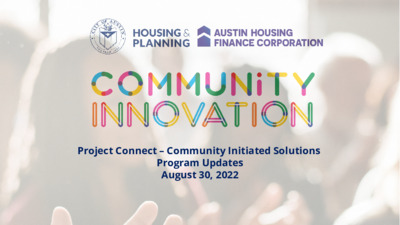01 Briefing Project Connect Anti-Displacement.pdf — original pdf
Backup

Project Connect – Community Initiated Solutions Program Updates August 30, 2022 Agenda • Anti-Displacement Investments: Timeline, Budget & 2022 Investments • Community Initiated Solutions: Funding Priorities, Funding Term, Amount & Eligibility • Equity Framework • Outreach & Engagement • Application & Review Process • Q & A $300 Million Project Connect Anti-Displacement Investments When voters approved $7.1 Billion for Project Connect in November 2020, Proposition A included $300 million for anti- displacement work in order to: • Help prevent the displacement of people due to rising costs that may result from transit-oriented development • Create long-term impact with focus on affordable housing units and asset-building opportunities that enhance people's economic mobility and prevent displacement. 3 4 Investment Years 1 & 2: $65 Million * Remaining $1 million will be used for program administration 5 Community Initiated Solutions: Funding Priorities $20 million is available for nonprofit organizations and partnerships for the following priorities: Renter/tenant stabilization Expansion and preservation of homeownership opportunities Other anti-displacement strategies 6 Funding Term and Amount • AHFC anticipates awarding up to 15 applications for the $20,000,000 • Minimum amount: $250,000 • Organizations may apply for up to three (3) years of funding understanding that if selected, the initial contract term will be for one (1) year. Second and third years are extended based on outcomes, performance, and an updated budget. 7 Eligibility • All investments must benefit existing residents who live within one (1) mile of Project Connect station or lines in communities with vulnerable, active, and chronic displacement risk. • Applicants must be one of the following: • Nonprofit organizations: 501(c)3 or 501(c)4 non-profit organization and a registered vendor with the City of Austin; or • Partnerships: Partnerships between nonprofits and for-profits, or community-based organizations. Partners must identify a lead organization responsible for coordinating the group’s activities, including fiscal administration, reporting, quality control, and deliverable management. The lead organization must be a registered vendor with the City of Austin. 8 Anti-Displacement Maps and Dashboard The Dashboard and Maps were created to pinpoint and prioritize areas within one (1) mile of Project Connect stations and lines, with residents most vulnerable to displacement • Use the dashboard and maps to demonstrate service • footprint of your proposal and which stage of displacement You can use maps and dashboard to answer question 1; using data from dashboard may help you craft appropriate solutions that will stave off displacement in your community Fact sheets were developed to further simplify targeting investments to areas and residents most at risk of displacement Interact with these maps at bit.ly/Anti-DisplacementMaps 9 Equity Framework • The Contract with the Voters required the development of the Equity Tool, a framework that centers equity and Anti- Displacement in any of the $300 million investments. • The Equity Tool was completed in 2021 and is part of the Nothing about Us Without Us report launched in January 2022. • To further engage community and ensure equity is centered in investments, the Project Connect Community Advisory Committee was created to review, evaluate and recommend Anti-Displacement investment opportunities to the Austin City Council. • The result = 16 strong proposals with community centered solutions to address displacement pressures for Austin households. 10 NOFA Outreach & Engagement • 5 Meet & Greet sessions (pre-solicitation) • Press Release & Press Conference • Emails to 220 organization leaders • Mailers to 192 organizations • Amplification kits to 20+ engagement partners (chambers, coalitions, support & convening organizations) & 400+ faith/neighborhood/community leaders • 6 Technical Assistance workshops 11 Application • Applications closed on June 27, 2022 (extended from June 13) • Application evaluation criteria was informed by the Nothing About Us Without Us report and tool • 38 Applications were received with a requested dollar amount of over $54 million 12 Review Process The application review process involves multiple evaluations by different groups. • Completeness Check Applications will be pre-screened by staff to ensure minimum requirements are met. • Community Evaluation Panel Applications will be reviewed by a community evaluation panel composed of practitioners, academics, and stakeholders from communities most impacted by displacement. The panels will review and score proposals using evaluation criteria informed by the Nothing About Us Without Us report and tool. The review panels will provide a list of scored, ranked proposals to a working group of the CAC. • Review Panel A working group of the Community Advisory Committee will consider balances between funding categories and recommend proposals for funding to AHFC Board for final approval. 13 Community Evaluation Panel Applicants 88 applications received / 25 evaluators selected Prefer not to answer 4% Asian and/or Asian American 11% 65 years or older 4% Native and/or Indigenous 3% White 11% Middle Eastern 0% Hispanic and/or Latina/Latino /Latinx 39% Black and/or African American 32% Race/Ethnicity 50-64 years old 16% 19-34 years old 36% 35-49 years old 44% Age I am currently experiencing housing insecurity or homelessness 8% I own my home 20% home provided by my employer 4% I rent my home 68% Housing Status 14 Timeline Apply Review Award April to June June - August September Onward Call for Applications Technical Assistance Recruit, Appoint, & Train Evaluators Completeness Check Community Evaluation Panel Review Panel Approval of Award Recommendations Finalize Contracts Applications open: April 11 Deadline to apply: June 27 Community Evaluator Applications April 20 – May 20 Technical Assistance Workshops April 27 – June 10 Evaluation Panel Review Summer 2022 CAC Working Group Recommendations Late Summer/Fall 2020 Recommendations to City Council/ AHFC Board September 2022 Funds Disbursed Fall 2022 - Winter 2023 We are here! Questions